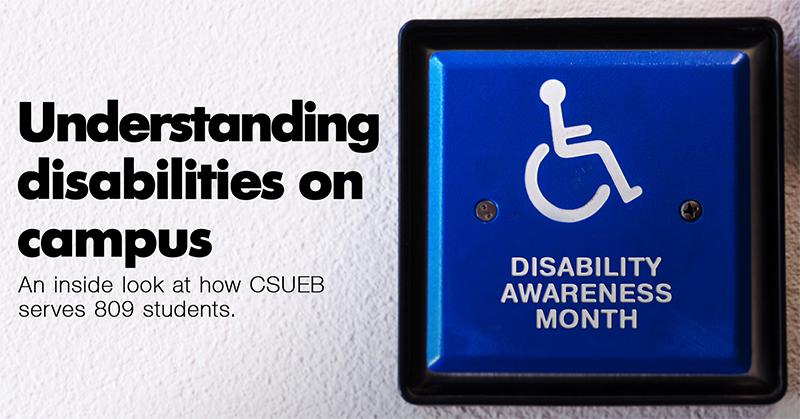Understanding disabilities on campus
October 8, 2014
Imagine a world in which everyone thought they were healthy and whole, but thought you were incomplete and impaired even though you didn’t feel that way. This is the daily struggle of people with disabilities.
During Disability Awareness Month, the Office of University Diversity and Accessibility Services at California State University, East Bay are raising awareness about the ideas of inclusiveness and equal access and opportunity for all students, regardless of the challenges the environment may impose on them.
Accessibility Services helps create that environment for 809 students at CSUEB whose challenges range from problems with mobility to problems with attention and hyperactivity. Some students have more than one challenge that needs to be accommodated.
“These students have to self-disclose,” said Jaski Kohli, accessibility counselor. “There could be more than 809 students with disabilities on campus.”
Accessibility Services provides accommodations for more than 988 disabilities. Kohli said the largest groups served are people with learning disabilities, such as dyslexia, and psychological disabilities, such as anxiety and schizophrenia.
“There could be more than 809 students with disabilities on campus.”
— Jaski Kohli
Accommodations vary because each challenge needs to be addressed in its own way, according to Accessibility Services. Accessibility counselors help students determine the appropriate accommodations for their particular needs.
For instance, accessible testing is available for students who may need more time and minimal distractions, while accessible media provides students with an alternative format for their books and class materials.
Project Impact, a federally funded student support services program, provides wellness counseling, tutoring services, computer lab access, workshops and more.
The College Link Program, a fee-based program for students with a diagnosis on the Autism Spectrum, provides academic coaches, subject-specific tutoring, independent living skills coaching and a conversation club.
Many people with disabilities have made notable contributions to society when they have been made to feel included.
Helen Keller, Stevie Wonder, Stephen Hawking and Franklin Roosevelt are a few examples of individuals who have made significant contributions to society while still facing special challenges.
The disabled label carries a negative connotation and is the result of subscribing to a medical model of understanding individuals who do not function in the current environment as easily, according to more recent research.
In the medical model, the disability is seen to come from within the person and addresses students’ limitations instead of strengths, making it reactive in nature. Historically, this has led to issues of discrimination and segregation in housing, employment and many other areas of life.
The social model of understanding is more proactive and emphasizes that it is not the person who is disabled; rather it is the environment that is disabling the individual. Given the proper environment, any challenges can be overcome.
People with disabilities routinely encounter what Katie Brown, director of Accessibility Services, called micro-aggressions from the community.
Micro-aggressions can manifest as outright rudeness or it can take a more subtle form, such as asking someone to many questions about his or her disability or using condescending language.
In the social model, anyone with the ability to make changes to the environment is capable of helping individuals with accessibility challenges. For members of the campus community, this could translate simply to being a little more respectful.
For more information about accessibility challenges and students’ experiences, attend one of the Disability Awareness Month events on campus. If you would like more information about requesting accommodations, contact Accessibility Services at [email protected].

